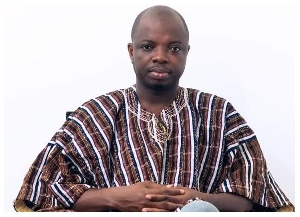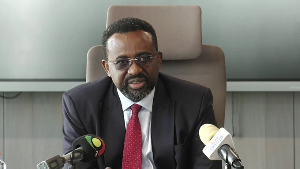The campaign and the initiative to openly mix Ghana?s innate traditional values with both the legacies of colonialism and the enabling aspects of the global culture is gradually coming to fruition with Ghana?s Chief Justice, Justice George Kingsley Acquah, announcement, as carried by the innovative Ghana News Agency (GNA), that the Judicial Service will be reconciling the customary (that?s traditional laws) ?adjudication capacity of chiefs with the administration of justice at the community.?
In the shape of things to come, as Justice Acquah is creatively demonstrating, for some time now, the World Bank, the Canadian International Development Agency (CIDA), some non-governmental organizations and some media houses, thinkers/activists like the Asantehene (King of the Asante ethnic group), Otumfuo Osei Tutu 11, Dr. George Ayittey and Kofi Akosah-Sarpong have been campaigning the appropriation and mixing of Ghana?s traditional values in the country?s development process, especially in policy development. The reason is that the British colonial regime that rule Ghana for long time failed to do so with the ostensible wrong-headed conviction, born out of West?s civilizing mission, that Ghanaian values were inferior and that the West?s values were much more civilized and should be replicated in Ghana and Africa. This idea has created long-running distortions and confusion in Ghana?s development process, worsened by Ghanaian elites? inability to think well and mix well all the values (both foreign and indigenous) wheeling in Ghana?s development process.
How do we know that the West is re-thinking the development confusions it created in Ghana or Africa and helping in the reconciliation of indigenous Ghanaian and Western imposed laws as seen in Justice Acquah?s judicial reforms? By way of the World Bank, one of the key faces of Western development paradigms and civilizing missions, and the GTZ, Germany?s key international development agency, funding the Ghana Judiciary Services reforms in order to bring traditional legal values on board the colonially-imposed mainstream ones in Ghanaian communities, where most Ghanaians live and where people understand their traditional customary laws better, because it emanates from within their innate values, than the Western imposed laws. Still, materially and logically, by incorporating ?chiefs and other traditional leaders in the administration of justice and preparing ?the ground for formal recognition and incorporation of such responsibilities and assignments into the judicial system,? Ghanaian indigenous values, for long suppressed in progress scheme of things because of colonialism and Ghanaian elites? inability to think holistically, will be exposed, grilled, strengthened, and developed as it is challenged to deal with national problems.
In Justice Acquah, Ghana, especially her elites, are seeing the flowering of development wisdom. Why? Because unlike yester-years Justice Acquah is attempting to ?reconcile traditional and modern [Western] jurisprudence in the overall administration of justice in the country,? consulting the National House of Chiefs (NHC), key carriers of Ghanaian innate values, a departure since the birth of Ghana in March 6, 1957, and in the process offering traditional rulers the break to ?share their vision and ideas? in the incorporation of traditional legal values in the mainstream judicial services. Justice Acquah?s judicial reforms wisdom is plainly seen in the piece ?UNCLOGGING THE COURTS: A LOOK AT MEDIATION AS A VIABLE OPTION IN GHANA,? (www.thisweekghana.com, September 23, 2005) where Ghanaian-American, Nii Lantey Okunka Bannerman, who holds United States Supreme Court certification to practice as a licensed mediator in Virginia, explains that ?mediation as a conflict resolution tool has its roots in Africa? traditional values.
Bannerman argues that much of the troubles the Ghanaian judiciary is facing ? long-running delays, corruption, inadequate personnel, tribalism, and high cost ? will be minimized if mediation as a Ghanaian/African legal value is employed in the settling of disputes. ?In my view, it is the quickest and simplest way to solving conflict without worrying about cost and corruption. Alas, a probable solution to the corruption menace in our judiciary? Is this a eureka moment or what? No high fives yet! Let get it going and evaluate to see! Have you wondered why we have not resorted to this method to unclog our constipated courts? Why are we so madly in love with the adversarial colonial court system to the extent that we won?t ?Sankofa? a process that has worked beautifully for us over the years? Is this not the method that the now troubled chiefs and our ever so revered elders used in the past till the white man introduced the adversarial court system??
That Bannerman?s thoughts are reflected in Justice Acquah?s and vice versa is no accident since, as the German thinker Karl Marx would say, both minds are linked by an invisible thread in the wake of the emerging Ghana renaissance. Who is Justice George Kingsley Acquah who is driven by such deep wisdom putting such huge challenges on himself by his bold conviction that the reconciling, or mixing, of Ghanaian indigenous legal values will help in the progress of the Ghanaian judicial services and in the larger Ghanaian development process, and, in this believe, thinks ?chieftaincy was a potent traditional institution that could play a major role in the peace and development of the nation??
Born in Sekondi in Ghana?s Western Region in March 6, 1942, Justice Acquah became Ghana?s Chief Justice in June 20, 2003. Like the Asantehene who is attempting to push the frontiers of Ghana?s progress by bringing on board Ghana?s indigenous values in her progress, the man who is initiating the judicial reforms attended Adisadel College, Cape Coast, in Ghana?s Central Region from 1957 to 1963 for both his West African Examination Council Ordinary (WAEC) and Advanced Level Certificates and the University of Ghana, Legon in 1964 to 1967 where he obtained a B.A (Hons) in Philosophy. Between 1968 and 1970 Justice Acquah studied and obtained LL.B. Hons in Law from Legon and from 1970 to 1972 entered the Ghana Law School where he obtained his Professional Certificate in Law and was called to the Bar in 1972. His rich employment record included private legal practice from 1972 to 1989; High Court Judge from 1989 to 1994; Appeal Court Judge from 1994 to 1995 and Supreme Court Judge from 1995 to present. Added to this, Justice Acquah has held long list of prestigious national and international positions such as the Patron, Commonwealth Legal Education Association in London.
Married with six children, Justice Acquah?s vision of reconciling Ghanaian indigenous legal values with the imposed mainstream ones has come about not only from his long lists of education and reflective powers but also from his huge global exposure which has occurred by attending local and international seminars, conferences and workshops and presented papers at a number of them. The product of all these experiences and good thinking within Ghanaian traditional values, a sign of emerging renaissance thought, has convinced Justice Acquah that the indefatigable Ghanaian chieftaincy ?was now confronted by growing political and social consciousness? and that ?it was time to bring the institution in line with the modern norms and practices of the judicial system, which was meaningful, effective and relevant to modern day judicial administration.? This is part of the dawn of the emerging Ghanaian Renaissance in her development process.



















